Story by Chris Iorfida • CBC
Dozens of elections are scheduled to take place across the globe this year, with more possible, including in seven of the world's 10 most populous countries, such as India, Russia, Mexico and Pakistan.
None have more potential to upend the global order than the U.S. presidential election on Nov. 5, according to Ian Bremmer, president of the Eurasia Group. The think-tank ranks the U.S. political system as the top global risk for 2024.
Bremmer told CBC's Power and Politics this week that in addition to the country's military, diplomatic and economic clout, "Democrats and Republicans not sharing the same basic understanding of facts" heightens the stakes of the vote.
The U.S. is "the one advanced democracy that does not have the ability to assure a legitimate free and fair transfer of power," said Bremmer.
Donald Trump's determination to stay in office and refusal to admit defeat in 2020 by raising unsubstantiated allegations of electoral fraud, along with the decentralized nature of the U.S. electoral college system, led a violent mob at the Capitol on Jan. 6, 2021, to threaten the certification of Joe Biden's victory.
There are fears of a repeat, with Trump, again a candidate, warning this week of "bedlam in the country" if he is not found immune from prosecution amid the criminal indictments he faces. Meanwhile, in a recent interview, influential Republican House member Elise Stefanik refused to guarantee she would certify a Democratic win in 2024.
Bremmer predicted that Washington, D.C., would be "locked down" to prevent a repeat of Jan. 6, but said the threat of immediate violence if Biden retains power is greater "in red states, in purple states, in states that are heavily contested and have large numbers of loyalists for Trump, many of whom are gunned up."
Just this week, prosecutors and judges overseeing Trump cases have reportedly been subjected to swatting incidents.
If Trump wins, he has promised to govern in a more authoritarian way, stocking agencies with loyalists over career civil servants, while pursuing criminal prosecutions of perceived rivals.
In terms of foreign policy, a shift from Biden back to the Republican Party would likely see the tenor of support from Washington change with respect to the wars in the Middle East and Ukraine — the Eurasia Group's next top two risks for 2024. Support for international alliances like NATO and for immigration and open global trade could also turn — Trump's rhetoric on refugees has been ratcheted up even from his first term, which saw separations of families arriving at the border.
Will keeping tabs on the political mood in the U.S., Canada will cast an eye further south on June 2, in an election involving USMCA trade pact partner Mexico.
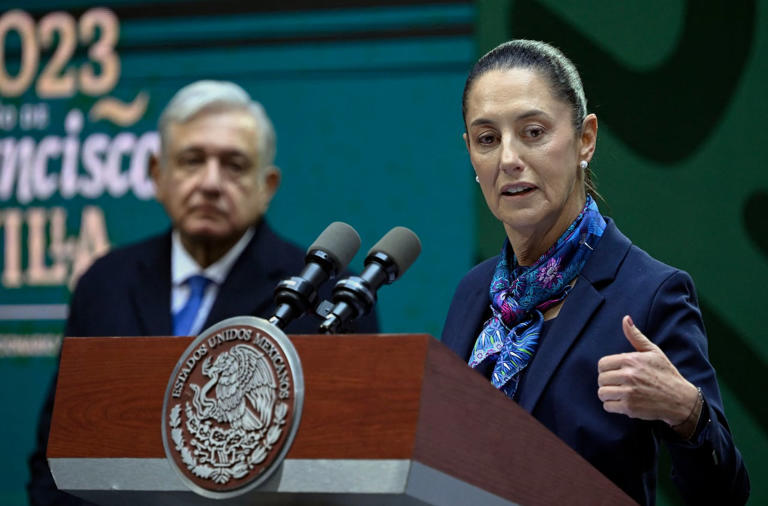
Claudia Sheinbaum, the mayor of Mexico City, speaks during a press conference in the capital on Jan. 20, 2023, as President Andres Manuel Lopez Obrador looks on. (Alfredo Estrella/AFP/Getty Images)© Provided by cbc.ca
Andres Manuel Lopez Obrador departs after one term, per Mexico's constitution. He has given a greater role to the military in operations traditionally held by police and other entities, as the country combats deadly violence fuelled by the drug trade. He also nationalized the production of energy and resources like lithium.
The Mexican vote will likely result in the country's first female president, as the top two candidates are former Mexico City mayor Claudia Sheinbaum, who is supported by Obrador, and former opposition senator Xochitl Galvez.
More than 50 countries that combined are home to half the planet's population are due to hold national elections in 2024, with huge implications for human rights, economies, international relations and prospects for peace in a volatile world.
Here's a look at some of the other votes.
Impactful Asian votes
A third consecutive win for William Lai's Democratic People's Party in Taiwan on Saturday over the opposition Nationalist Party could test the patience of Chinese leader Xi Jinping. Lai, who is currently vice-president, has promised to strengthen the island's defences.
Beijing has renewed its threat to use military force to annex the self-governing island it regards as its territory. Through its Taiwan Affairs Office, China has branded Lai "a hoodlum to the extreme."
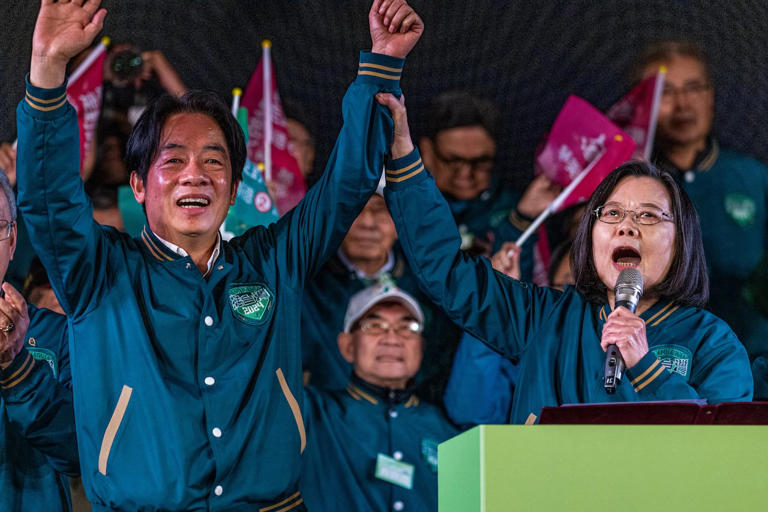
Taiwan's president, Tsai Ing-wen, right, hopes to be succeeded by Democratic Progressive Party candidate William Lai, left. The pair are seen at a rally Thursday in Taipei City, Taiwan. (Annabelle Chih/Getty Images)© Provided by cbc.ca
Washington provides substantial arms to Taiwan, and President Biden has promised the U.S. would help defend it in the event of an attack.
Pakistan's Feb. 8 parliamentary election is being contested under the eye of the country's powerful military and in a climate where political rivals are frequently prosecuted.
Former prime minister Imran Khan is imprisoned, and election officials blocked him from running, while his rival, three-time prime minister Nawaz Sharif, was allowed on the ballot after his corruption convictions were overturned.
Indonesia President Joko Widodo makes way after a decade in office on Feb. 14, with Defence Minister Prabowo Subianto, a right-wing nationalist, competing against Ganjar Pranowo, whose running mate is Widodo's son. While Indonesia is considered Southeast Asia's largest democracy, corruption-tainted politics have been the norm since the end of the country's dictatorship in 1998.
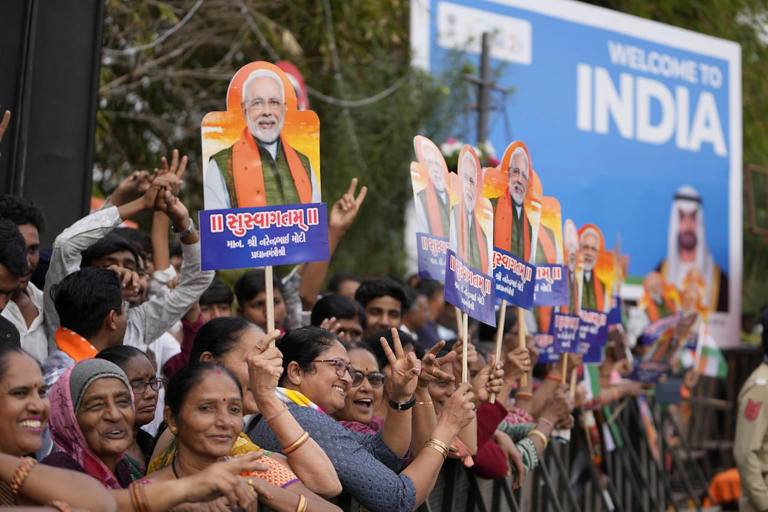
Supporters hold portraits of Indian Prime Minister Narendra Modi at an event in Ahmedabad on Tuesday. Modi is looking to secure a third straight term in office later this year. (Ajit Solanki/The Associated Press)© Provided by cbc.ca
Indian Prime Minister Narendra Modi of the right-wing Hindu nationalist Bharatiya Janata Party has strengthened India's position as an economic power through two terms in office, according to his supporters. Critics say assaults on free speech, as well as Hindu nationalist attacks on religious minorities, have grown brazen on his watch.
Despite previous losses, it appears Rahul Gandhi of the Congress Party will oppose Modi again in the election, which is due by mid-2024.
Autocrats keep up pretense
In some countries, the balloting will not be free or fair, and questionable at best.
On Monday in Bangladesh, Prime Minister Sheikh Hasina won a fourth successive term. The opposition parties boycotted the Bangladesh vote, as many of their politicians have been jailed on charges they say are politically motivated.
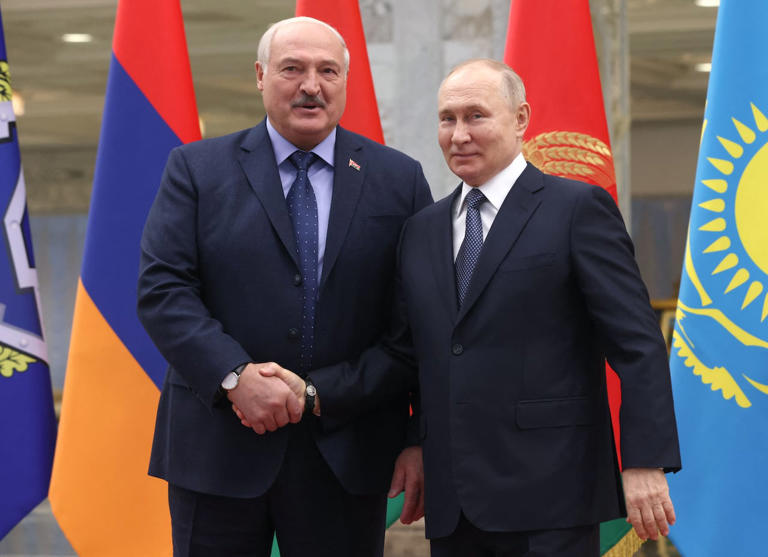
Belarusian President Alexander Lukashenko, left, shakes hands in Minsk with Russian President Vladimir Putin on Nov. 23, 2023. Each is expected to maintain a decades-long grip on power in elections this year. (Konstantin Zavrazhin/AFP/Getty Images)© Provided by cbc.ca
The U.S., overwhelmed by migrants arriving at the southern border through Central America, will be monitoring a Feb. 4 vote in El Salvador.
President Nayib Bukele has won widespread support from the public since using emergency powers for an aggressive crackdown on drug gangs. But he has been criticized for intimidation tactics that have evoked the country's ultra-violent political past, such as bringing in troops to the legislative assembly amid a dispute with the opposition in 2020.
A Supreme Court filled by his party's appointees cleared Bukele to run on Feb. 4, despite a constitutional ban on presidents serving two consecutive terms. Bukele is not expected to face serious competition.
Russian President Vladimir Putin faces only token opposition in his bid for a fifth term on March 15. His main rival, Andrei Navalny, is imprisoned.
Putin supporter Alexander Lukashenko is likely to remain the only president Belarus has known in its 30-year history on Feb. 25. Lukashenko's government crushed protests during a disputed 2020 election season, and main rival Sviatlana Tsikhanouskaya fled to Lithuania. She was later sentenced to prison in absentia.
Britain to set date?
Elections in June for the parliament of the 27-nation European Union will be a sign of whether traditional parties can see off populist rivals, many of which are skeptical of military support for Ukraine.
In Britain, which is no longer part of the EU, the ruling Conservatives must call an election by Jan. 28, 2025. The party has held power for 14 years under five prime ministers, including Rishi Sunak, who has hinted at a vote in the second half of 2024.
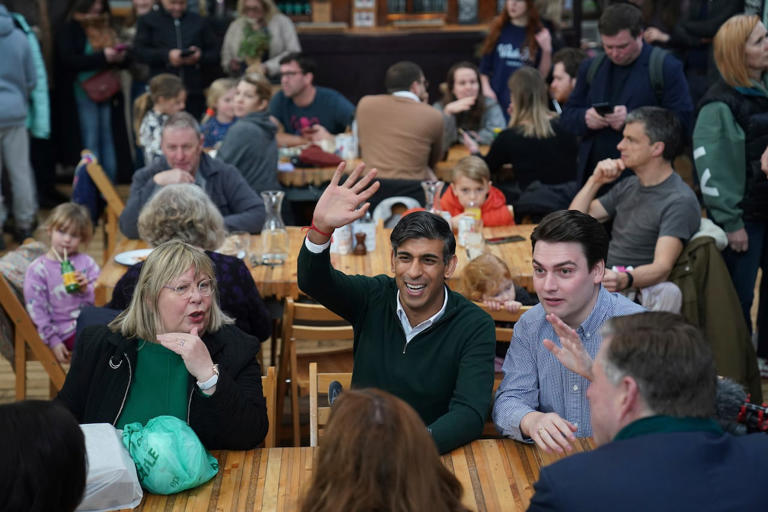
British Prime Minister Rishi Sunak, centre, meets members of the public on Jan. 5 at Altrincham Market in Manchester, England. It is expected Sunak will be stepping up campaign-style events as 2024 proceeds. (Jacob King/The Associated Press)© Provided by cbc.ca
On the campaign trail, Labour Party Leader Keir Starmer will look to highlight the instability of his rivals, as well as the country's lagging economic recovery in comparison to its G7 partners since the outbreak of the pandemic.
In West Africa, Senegal is regarded as a bastion of stability in a region that has seen eight military coups since 2020, including last year in Niger and Gabon. With President Macky Sall stepping down, his country's Feb. 25 election is seen as an indicator of Senegal's resilience.
No comments:
Post a Comment